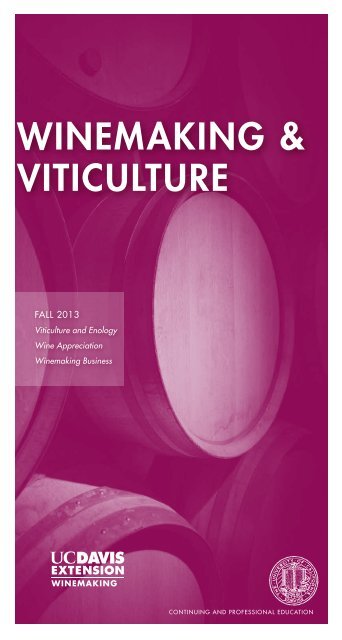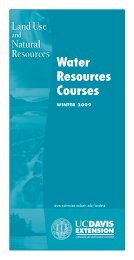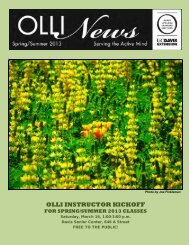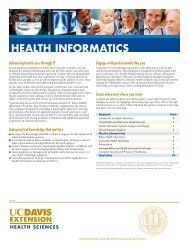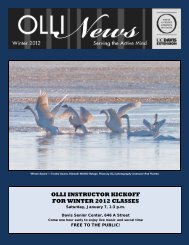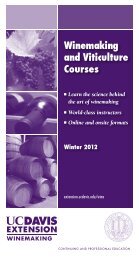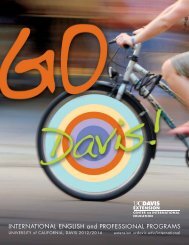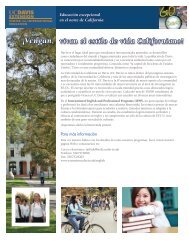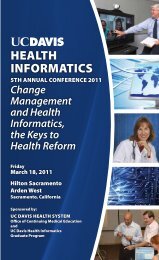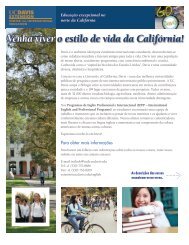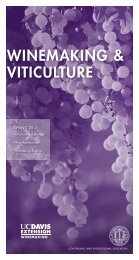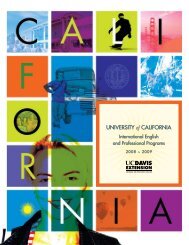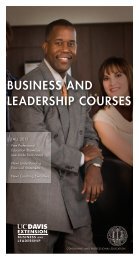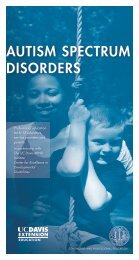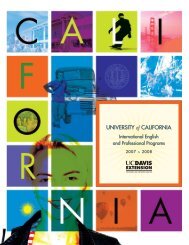Winemaking & Viticulture - UC Davis Extension
Winemaking & Viticulture - UC Davis Extension
Winemaking & Viticulture - UC Davis Extension
- No tags were found...
You also want an ePaper? Increase the reach of your titles
YUMPU automatically turns print PDFs into web optimized ePapers that Google loves.
<strong>Winemaking</strong> &<br />
<strong>Viticulture</strong><br />
fall 2013<br />
<strong>Viticulture</strong> and Enology<br />
Wine Appreciation<br />
<strong>Winemaking</strong> Business<br />
CONTINUING AND PROFESSIONAL ED<strong>UC</strong>ATION
Master the art of<br />
winemaking<br />
With unparalleled learning from the finest instructors at your fingertips, pursuing<br />
your passion has never been easier. Learn the scientific framework for successful<br />
winemaking at <strong>UC</strong> <strong>Davis</strong> <strong>Extension</strong>, the source for wine science.<br />
Partnering with <strong>UC</strong> <strong>Davis</strong>’ world-renowned Department of <strong>Viticulture</strong> and Enology,<br />
our online <strong>Winemaking</strong> Certificate Program combines academic theory<br />
with real-world, commercial application. This unique approach gives you the<br />
knowledge, confidence and practical skills to achieve your goals, whether as a<br />
talented home winemaker, an industry professional or a wine enthusiast.<br />
As an online student, you have one-on-one access to some of the industry’s best<br />
instructors—seasoned winemakers, each with more than 20 years of professional<br />
experience. The convenient, interactive format provides an exceptional<br />
environment to expand your skills, exchange ideas and build an extensive<br />
network that can support you throughout your career.<br />
Course 1: Introduction to Wine and<br />
<strong>Winemaking</strong><br />
(Course description on next page.)<br />
The following courses constitute the rigorous upperdivision<br />
science courses at the heart of the program<br />
and require a working knowledge of basic collegelevel<br />
chemistry.<br />
Course 2: Wine Production<br />
Get a taste of all technical aspects<br />
of wine production with an emphasis<br />
on fermentation management and<br />
pre-fermentation processes, options<br />
and strategies. Explore how the many<br />
winemaking decisions affect the<br />
resulting wine’s style.<br />
Course 3: Quality Control<br />
and Analysis in <strong>Winemaking</strong><br />
Developed with specific winemaking<br />
stages in mind, this course explores<br />
the theory and the practice of<br />
winemaking analytical methods and<br />
how they help with the understanding<br />
of juice, fermentation, wine aging,<br />
problem solving, bottling and legal<br />
issues. Examine the aspects of<br />
microbial control from grape harvest<br />
to bottling of wine.<br />
Course 4: Wine Stability<br />
and Sensory Analysis<br />
Delve into the principal physical,<br />
chemical and microbiological<br />
concepts involved in wine aging and<br />
conservation along with methods for<br />
testing and controlling wine stability.<br />
Learn basic human anatomy and<br />
physiology of the organoleptic senses<br />
as they influence your interaction with<br />
wine in addition to basic sensory<br />
science testing protocols.<br />
Course 5: <strong>Viticulture</strong> for Winemakers<br />
Review how basic viticulture relates<br />
to wine production. Learn how<br />
winegrapes are grown, and study<br />
the biological, environmental and<br />
management factors that influence<br />
fruit and wine quality. You will<br />
develop a hypothetical vineyard to<br />
meet specific winemaking objectives<br />
during the course.<br />
Completion of one semester of college chemistry is<br />
required for admission to the program. Accepted<br />
students will pay a one-time, nonrefundable certificate<br />
fee of $75 when enrolling in Course 2: Wine<br />
Production.<br />
extension.ucdavis.edu/winemakingcert<br />
2
viticulture and enology<br />
Learn about the cultivation of grapes and the science of wine and<br />
winemaking. From integrated pest management and cover crops to<br />
wine chemistry and filtration, <strong>UC</strong> <strong>Davis</strong> <strong>Extension</strong> offers a variety of<br />
courses for novice and experienced grape growers, winemakers and<br />
wine lovers.<br />
ONLINE<br />
Introduction to Wine and<br />
<strong>Winemaking</strong><br />
3 quarter units academic credit, X402.26.<br />
Whether you’re interested in a career in<br />
the wine industry or are just a devoted<br />
oenophile, you can take this unique<br />
course from anywhere in the world.<br />
Access top-quality, college-level course<br />
material in an interactive, web-based<br />
environment and gain exposure to an<br />
internationally recognized program and<br />
instructors, including industry experts<br />
and <strong>UC</strong> <strong>Davis</strong> faculty. Learn about topics<br />
such as fundamentals of the winemaking<br />
process, wine and health issues,<br />
interpreting a wine label, basic wine<br />
tasting and the history of wine. Lectures<br />
are provided by faculty in the <strong>UC</strong> <strong>Davis</strong><br />
Department of <strong>Viticulture</strong> and Enology.<br />
This course can be taken as a standalone<br />
course or as the first course in the<br />
<strong>Winemaking</strong> Certificate Program. For<br />
more information about the certificate<br />
program or to apply, please visit our<br />
website.<br />
extension.ucdavis.edu/winemakingcert<br />
Refund Policy<br />
Refunds for this course must be requested within two weeks<br />
of the start date. The refund-processing fee is $65.<br />
HILDEGARDE HEYMANN, Ph.D., is a professor in the<br />
Department of <strong>Viticulture</strong> and Enology, <strong>UC</strong> <strong>Davis</strong>.<br />
Enroll now through Sept. 26 and complete by Dec. 16.<br />
Passwords issued starting Sept. 30.<br />
Technical requirements: Visit our website for details.<br />
$685. Enroll in section 132VID251.<br />
Current Issues in Vineyard<br />
Health<br />
Noncredit.<br />
Guest instructors, chosen for their<br />
involvement in developing solutions to<br />
the problems associated with grape<br />
pests and diseases, provide the latest<br />
management information on current<br />
topics, including:<br />
Breeding grapevines for Pierce’s<br />
Disease resistance<br />
Controlling grape fungal disease such<br />
as powdery mildew and Botrytis bunch<br />
rot diseases<br />
The grape growers’ role in managing<br />
exotic pests and diseases<br />
Mealybugs and grapevine leafroll<br />
viruses<br />
Lectures are provided by a talented<br />
group of speakers comprised of <strong>UC</strong><br />
faculty, departmental experts and <strong>UC</strong><br />
farm advisers who cover: the biology of<br />
mealybugs in California and their control,<br />
the dangers of spreading mealybugs in<br />
pomace and prevention of the disease,<br />
and damage reduction in the vineyards.<br />
DEBORAH A. GOLINO, Ph.D., is director of Foundation Plant<br />
Services and is a <strong>UC</strong> Cooperative <strong>Extension</strong> specialist in<br />
the Department of Plant Pathology, <strong>UC</strong> <strong>Davis</strong>. Her research<br />
focuses on the study of grapevine virus, virus-like diseases<br />
and the reduction of the damage they cause.<br />
1 meeting.<br />
Nov. 22: Fri., 9 a.m.-4 p.m.<br />
<strong>Davis</strong>: Da Vinci Building, 1632 Da Vinci Ct.<br />
$190. Includes course material and lunch. Enroll in section<br />
132VIT204.<br />
3
Introduction to Wine Analysis<br />
Noncredit.<br />
Examine the basics of wine analysis<br />
for commercial and advanced home<br />
wine production. Designed for serious<br />
winemakers, winery lab employees<br />
and small commercial winemakers, this<br />
one-day class combines short lecture<br />
and hands-on experience. Gain practice<br />
with, and examine the limitations of,<br />
each analysis. Work in small groups<br />
with university wines to gain familiarity<br />
with these common lab analyses: free<br />
and total SO 2<br />
by Ripper and Aeration-<br />
Oxidation, volatile acidity distillation,<br />
titratable acidity, pH, malolactic paper<br />
chromatography and percentage of<br />
alcohol by ebulliometer. Some aspects<br />
of wine chemistry will be reviewed as<br />
it pertains to each analysis. For optimal<br />
understanding of the results of each<br />
analysis, it is highly recommended that<br />
participants have previously attended<br />
Introduction to Wine Chemistry.<br />
Please bring a calculator, notebook, old clothes or lab coat,<br />
and closed-toe, comfortable shoes (no sandals or crocs,<br />
please). Be advised that our teaching labs observe OSHA<br />
rules. There is no eating or drinking of any liquids (including<br />
water) allowed in the labs. It is recommended that you<br />
bring a bag lunch due to the facility location and limited<br />
food service on campus.<br />
MICHAEL RAMSEY is the teaching laboratory manager<br />
for the Department of <strong>Viticulture</strong> and Enology, <strong>UC</strong> <strong>Davis</strong>,<br />
where he is responsible for assisting students in planning<br />
and coordinating department laboratory classes. He is a<br />
winemaker for a small vineyard operation in Winters, Calif.<br />
as well as a judge at regional brewing competitions.<br />
1 meeting.<br />
Sept. 7: Sat., 9 a.m.-6 p.m.<br />
<strong>UC</strong> <strong>Davis</strong>: Robert Mondavi Institute for Wine & Food –<br />
1127 North<br />
$255. Includes lab supplies. Enroll in section 131VIT221.<br />
Successful Home<br />
<strong>Winemaking</strong><br />
Noncredit.<br />
Receive an overview of all phases of<br />
home wine production in this course<br />
designed for beginning home winemakers<br />
with little or no experience. Learn about<br />
fermentation theory, yeasts and starter<br />
cultures, white and red wine production,<br />
common problems, sanitation and<br />
cleaning agents, and equipment suitable<br />
for small-scale wine production. This is an<br />
excellent overview for anyone considering<br />
making wine for the first time this season.<br />
THOMAS COLLINS is the senior manager of fermentation<br />
research at Foster’s Wine Estates where he oversees the<br />
development and implementation of a broad range of<br />
winemaking research projects. He has been with Foster’s for<br />
four years conducting pilot scale wine fermentations and has<br />
extensive home winemaking experience.<br />
1 meeting.<br />
Sept. 14: Sat., 8:30 a.m.-3:30 p.m.<br />
<strong>Davis</strong>: Da Vinci Building, 1632 Da Vinci Ct.<br />
$140. Includes course material. Please bring a sack lunch.<br />
Enroll in section 131VIT212.<br />
facebook.com/ucdewine<br />
extension.ucdavis.edu/email<br />
“The <strong>UC</strong> <strong>Davis</strong> <strong>Extension</strong> <strong>Winemaking</strong> program<br />
helped me hone and polish what I had already<br />
learned and also dispel some of the myths. As<br />
a 28-year-old winemaker, I also gained a little<br />
more credibility in a moreover mature workforce.”<br />
—Eric Harris, TWO-EEs Winery, Huntington, Ind.<br />
4
Wine Appreciation<br />
Through various tastings, this course will enhance the critical tasting<br />
ability of novice oenophiles. Learn the descriptive language of wine<br />
and study the components of wine appearance, aroma and flavor.<br />
Introduction to Sensory<br />
Evaluation of Wine<br />
Great wine tips from<br />
john B.<br />
Noncredit.<br />
Novice oenophiles, enhance your critical<br />
tasting ability and learn basic aspects<br />
of sensory evaluation often overlooked<br />
in most wine tastings. Study the different<br />
components of wine appearance, aroma<br />
and flavor. Participate in tastings of<br />
doctored wines in blind and known<br />
tastings. Explore the origins of desirable<br />
and undesirable flavors of wine and<br />
the stylistic contributions of winemaking<br />
techniques. Lectures by faculty members<br />
of the world-renowned <strong>UC</strong> <strong>Davis</strong><br />
Department of <strong>Viticulture</strong> and Enology will<br />
be interspersed throughout the program.<br />
Emphasis is placed on correct use of<br />
wine descriptive terminology.<br />
Our very own John Buechsenstein<br />
shares his knowledge on a<br />
variety of wine evaluation<br />
topics in a series of short video<br />
“vignettes.” Subscribe to our<br />
YouTube channel where new<br />
videos will be posted regularly.<br />
Cheers!<br />
youtube.com/ucdavisextension<br />
Note: You must be 21 years of age or older to enroll and<br />
attend.<br />
JOHN BUECHSENSTEIN has been a winemaker and wine<br />
educator for more than 30 years. He has extensive<br />
experience making wine in the Napa Valley and other wine<br />
growing regions of the California coast. Buechsenstein’s<br />
passion for wine has taken him to the wine regions of<br />
Bordeaux, Champagne, Paris and Rhone Valley in France.<br />
2 meetings.<br />
Oct. 12-13: Sat.-Sun., 9 a.m.-4 p.m.<br />
<strong>Davis</strong>: Da Vinci Building, 1632 Da Vinci Ct.<br />
$550. Includes two lunches and all wine. Enroll in section<br />
132VIT200.<br />
5
winemaking business<br />
These courses will teach you the ins-and-outs of running your own<br />
winery or vineyard—from public relations to taxation and accounting.<br />
New!<br />
Public Relations and Social<br />
Media for Small Wineries<br />
Noncredit.<br />
Winery public relations has changed<br />
dramatically since the days of simply<br />
sending out samples and hoping for the<br />
best. The Internet has leveled the playing<br />
field of customer contact and helped<br />
expand the ways in which wineries can<br />
effectively tell their stories. Learning<br />
to integrate new tools, such as social<br />
media, with proven public relations<br />
communications techniques is essential for<br />
setting your winery and brand apart from<br />
the competition. Acquire strategies for PR<br />
success without spending too much in the<br />
process.<br />
This two-day course covers:<br />
The importance of a public relations<br />
plan that integrates social media<br />
Tactics and strategies for PR success<br />
Interacting with wine writers, bloggers<br />
and other media people<br />
Why building a brand means more<br />
than hoping for great scores or reviews<br />
Guest speakers include wine writers and<br />
bloggers from major publications, as well<br />
as social media experts who will provide<br />
examples of how an effective public<br />
relations program should be part of your<br />
successful marketing effort.<br />
RUSTY EDDY has been in the wine industry for 30 years.<br />
He has established relationships with key local and national<br />
media outlets and has experience in public relations,<br />
communications, sales and strategic planning.<br />
2 meetings.<br />
Dec. 5-6: Thurs.-Fri., 9 a.m.-4 p.m.<br />
<strong>Davis</strong>: Da Vinci Building, 1632 Da Vinci Ct.<br />
$395. Includes two lunches and course material. Enroll in<br />
section 132VIT202.<br />
Taxation and Accounting for<br />
the Small Vineyard<br />
6.5 CPE CEUs.<br />
Understanding relevant tax and<br />
accounting issues is a vital step for<br />
successful start-up and continuing<br />
vineyard operations. This course is<br />
tailored to help both the vineyard owner<br />
and entrepreneur. Topics include:<br />
Formulating a business plan<br />
Choosing the form of doing business<br />
which directly affects permissible farm<br />
accounting methods<br />
Avoiding the problems of passive<br />
activity<br />
Qualifying as a farmer under the tax<br />
code<br />
Farm accounting, including<br />
depreciation and inventory cost<br />
capitalization rules<br />
Estate planning<br />
Learn the principles of accounting for a<br />
vineyard operation from the initial start-up<br />
phase through the land clearing, planting,<br />
pre-productive and productive stages.<br />
Tax aspects and specific accounting<br />
techniques for the expenditures in each<br />
phase will be discussed in detail.<br />
GREG SCOTT is a tax partner with Price Waterhouse Coopers<br />
Accountants.<br />
1 meeting.<br />
Oct. 28: Mon., 9 a.m.-4 p.m.<br />
<strong>Davis</strong>: Da Vinci Building, 1632 Da Vinci Ct.<br />
$190. Includes lunch and course material. Enroll in section<br />
132VIT205.<br />
6
Taxation and Accounting for<br />
the Small Winery<br />
6.5 hours CPE credit.<br />
As winery owners and entrepreneurs,<br />
it is crucial to understand and remain<br />
apprised of relevant tax and accounting<br />
issues, which can often mean the<br />
difference between the success or failure<br />
of a winery operation. Designed for<br />
wineries of 60,000 cases and fewer,<br />
this course explores the advantages and<br />
disadvantages of incorporation and<br />
Subchapter S status versus using limited<br />
liability companies, determination of<br />
cost of goods sold, inventory valuation<br />
and costing (including inventory cost<br />
capitalization rules), advantages<br />
and disadvantages of electing LIFO,<br />
accelerating deductions through farm<br />
accounting procedures, depreciation<br />
methods, fringe benefits and estate<br />
planning.<br />
For more<br />
information<br />
or to<br />
enroll<br />
call<br />
(800) 752-0881<br />
email<br />
extension@ucdavis.edu<br />
or visit us online<br />
extension.ucdavis.edu/wine<br />
GREG SCOTT. See bio at left.<br />
1 meeting.<br />
Oct. 29: Tues., 9 a.m.-4 p.m.<br />
<strong>Davis</strong>: Da Vinci Building, 1632 Da Vinci Ct.<br />
$190. Includes lunch and course material. Enroll in section<br />
132VIT206.<br />
if your plans change<br />
Refunds, less a $30 processing fee, will be granted if the request is<br />
received seven calendar days before the course begins. At that time, you<br />
can also discuss transferring your enrollment to another program or sending<br />
a substitute. Requests for withdrawal without a refund must be received<br />
before the last meeting of the course. Requests for withdrawals or refunds<br />
may be made by phone, fax or in writing. Please include the student’s<br />
name, course title and course section number. For information about other<br />
alternatives, call <strong>UC</strong> <strong>Davis</strong> <strong>Extension</strong> at (800) 752-0881.<br />
Not produced at state expense<br />
<strong>UC</strong> <strong>Davis</strong> <strong>Extension</strong> is a self-supporting, nonprofit organization funded by<br />
course fees, grants and contracts.<br />
The University of California does not discriminate in any of its policies,<br />
procedures or practices. The university is an affirmative action/equal<br />
opportunity employer.<br />
ONLINE COURSE INFORMATION<br />
You must provide your email address when enrolling to receive your<br />
password. If you do not receive your password in the time frame noted,<br />
please visit the Online Learning Campus Support Center at extensiondlc.<br />
net/helpdesk. Open a new ticket, and select “Password Issues” from the<br />
Help Topics.<br />
If you plan to access an online course using an iPad, iPod or iPhone there<br />
are a variety of Flash web browsers available in the App Store.<br />
132145<br />
7
extension.ucdavis.edu/wine<br />
learn the science behind<br />
the art of winemaking<br />
fall 2013<br />
<strong>Viticulture</strong> and Enology<br />
Wine Appreciation<br />
<strong>Winemaking</strong> Business<br />
<strong>UC</strong> <strong>Davis</strong> <strong>Extension</strong><br />
University of California<br />
1333 Research Park Drive<br />
<strong>Davis</strong>, CA 95618-4852 132145-ZZ<br />
Nonprofit Org.<br />
U.S. Postage<br />
PAID<br />
<strong>UC</strong> <strong>Davis</strong>


